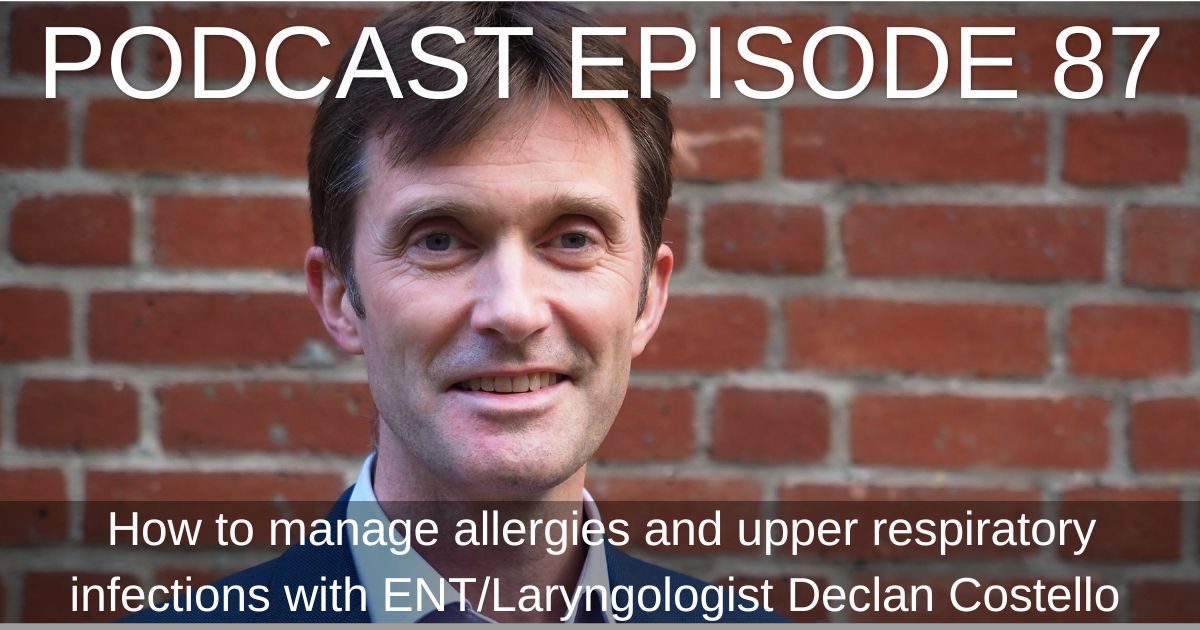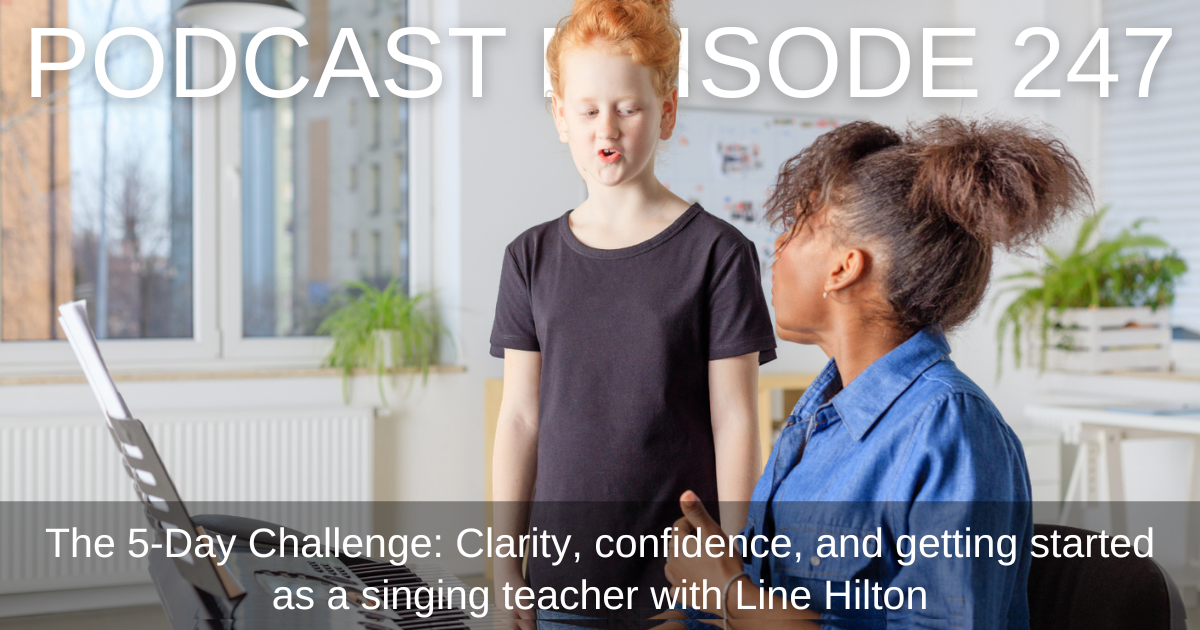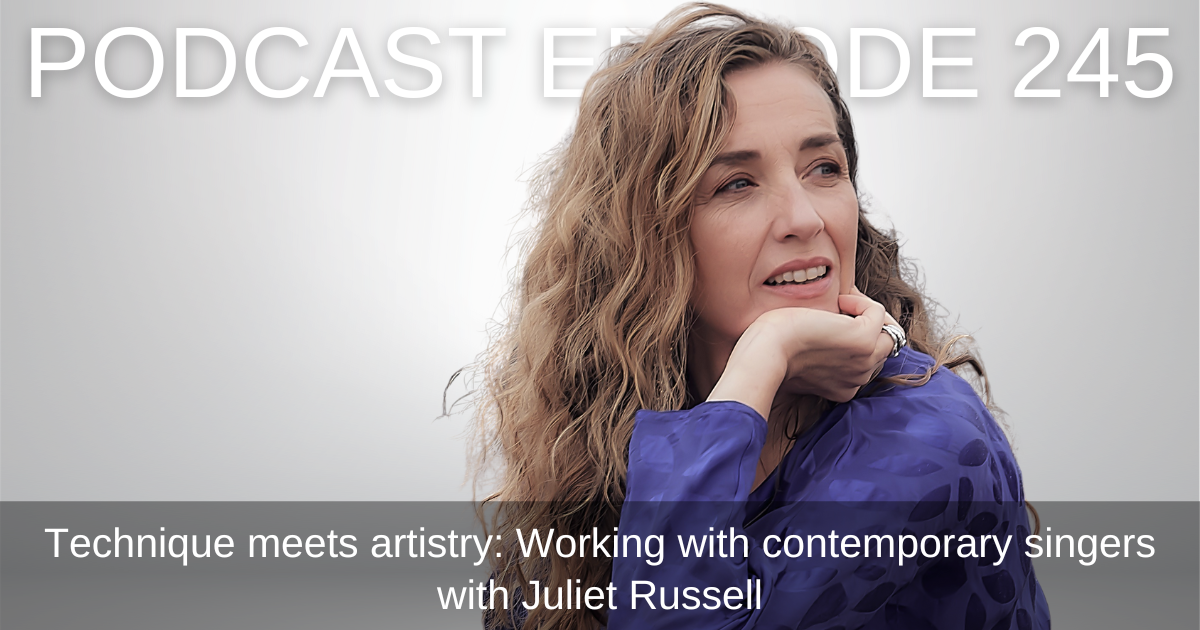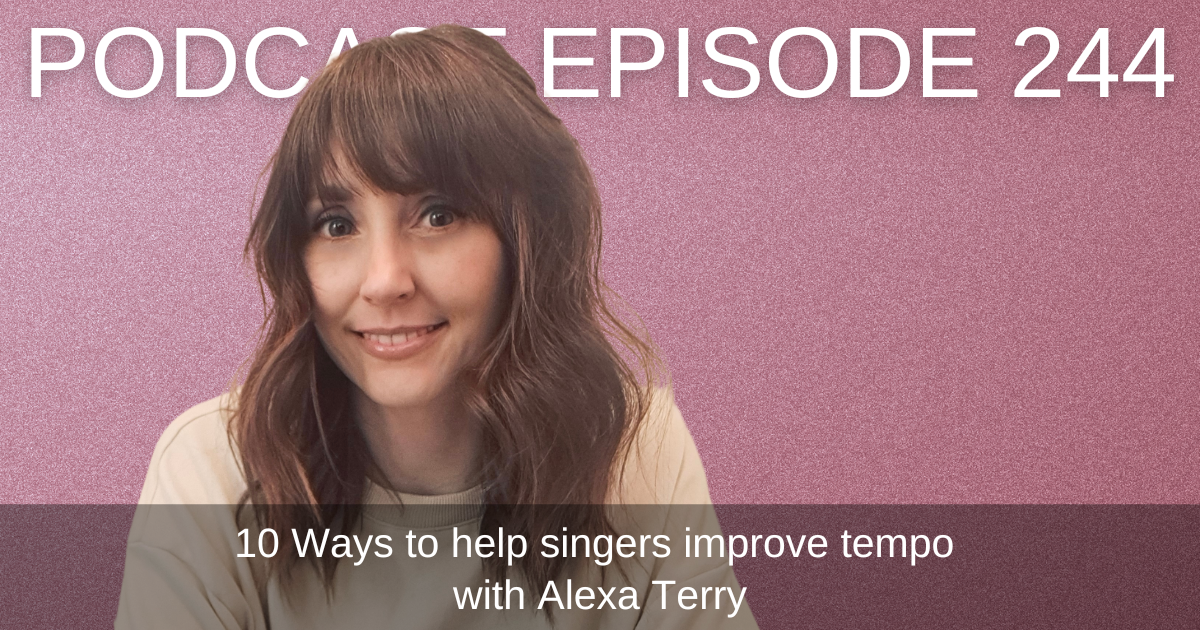Today we talk to laryngologist Declan Costello who, during the Covid-19 pandemic, helped coordinate research on the perceived dangers of aerosols and singing. A singer himself, Mr Costello is stationed at Wexham Park Hospital in Berkshire as a consultant ear, nose and throat surgeon specialising in voice disorders.
KEY TAKEAWAYS
- Pollen allergies have been quite rife this year and many have experienced symptoms for longer. The issue is that when you have an allergy, you develop a reaction that causes the lining of the nose and the throat to swell.
- If somebody comes into the studio with an allergy and they sound a little bit nasal, by and large, it’s okay to carry on singing – if the problem is really isolated to the nose and irritation.
- The concern is if somebody’s got an audible difference in their voice. If their voice is husky or if they’ve got difficulty with their range, then that makes you worry that maybe the vocal cords themselves are swollen.
- If you are keen to know precisely what you’re allergic to, then there are various blood tests and other kinds of tests that you can do to know exactly what it is you should be avoiding. Most people who have hay fever are allergic to a whole number of things, not just a single allergen.
BEST MOMENTS
‘General hay fever and stuffiness wouldn’t necessarily mean I would suggest stopping singing’
‘Colds are viral. They will do what they’re gonna do’
‘We didn’t go into it in order to open up singing again. We had to go into it completely dispassionately and saying, we don’t know what the dangers are’
EPISODE RESOURCES
Guest Website:
Social Media:
- Twitter: @Voicedoctor_uk
Relevant Links & Mentions:
- Neil Med Nasal Rinse: neilmed.com/unk
- Sterimar: sterimarnasal.co.uk
- Advised Nasal Spray: Dymista
ABOUT THE GUEST
Declan Costello is a consultant ear, nose, and throat surgeon specializing in voice disorders (a laryngologist). He studied music at St John’s College, Cambridge, where he was a choral scholar, and went on to study medicine at Imperial College. As a singer himself, he has a particular interest in treating voice disorders in performers. Having worked for ten years in Birmingham as a consultant, he moved to Wexham Park Hospital in Berkshire in 2018. He has published a number of books and has written many chapters, including the chapter on “Larynx” for the 42nd edition of “Gray’s Anatomy”. In the middle of 2020, at the height of the coronavirus pandemic, he helped to coordinate research on the perceived dangers of singing and aerosols. This research led to the UK government opening up its performance after a prolonged period of enforced silence.
Link to podcast presenter’s bios
SUBSCRIBE AND NEVER MISS AN EPISODE
Episode Transcription
SUMMARY KEYWORDS
singing, vocal cords, voice, allergies, singers, people, throat, nose, mucus, antihistamines, bit, difficult, tonsillitis, nasal sprays, teachers, vocal folds, irritation, pandemic, swollen, cold
SPEAKERS
Alexa Terry, Declan Costello
Alexa Terry 00:00
Welcome to Singing Teachers Talk, the podcast that brings you great interviews, insightful discussions and advice around the topic of singing and teaching singing. Now it’s over to your host for today’s episode. It’s me, Alexa Terry! Hello! We are in the company of laryngology royalty today getting to spend some time with the ENT who during the COVID-19 pandemic, helped coordinate research on the perceived dangers of aerosols and singing. He is a singer himself. And today a stationed at Wexham Park Hospital in Bershire as a consultant, ear, nose and throat surgeon specializing in voice disorders and what a treat it is to welcome you Mr. Declan Costello, how are you?
Declan Costello 00:49
Oh, thank you very much. I’m very well, it’s lovely to be here. Thank you for asking me really nice to be able to chat to you.
Alexa Terry 00:55
Yeah, I’m so thrilled to have the opportunity to speak with you, and especially on the topic of specific irritants that come up nowadays in our seasons. So pollen allergies have been quite rife this year, and many have experienced suffering symptoms for longer. And that’s said to be related to the climate change that we are going through. So what actually happens in our bodies, and specifically vocally when we experience hay fever or other allergies?
Declan Costello 01:24
Yeah, I mean, I think you’re absolutely right. There’s been this year 2022, there’s been quite a few patients I’ve seen who’ve had real problems with allergies, I think from season to season, different plants, cause problems for different people this year, the plane trees seem to cause particular issues. And there was a real focus for a few weeks when lots of people were suffering with that. The issue is that when you, when you have an allergy, you develop a reaction that causes the lining of the nose and the lining of the throat to swell with mast cells releasing IgE, and histamine. And that causes everything on the inside of the nose to swell, and potentially also the throat as well. So you end up not only with swelling of the lining of the nose, but it produces more mucus than usual, that mucus can drip down the back of the throat and cause irritation. And so the, yeah, the propensity for for people getting irritation in the throat is there during the hayfever season.
Alexa Terry 02:28
And what vocal symptoms are we going to be seeing? And what would you tend to see on a scope of somebody with irritating allergies?
Declan Costello 02:37
Yeah, well, the I mean, the primary thing is that when I look in, in somebody’s nose and throat with an endoscope, I’m primarily looking through the nose and inside the nose, it can look very congested and very swollen, there can be lots of mucus around. And then getting through the nose and into the back of the nose and the back of the throat can be difficult in itself just because trying to pass the endoscope through is difficult. When it comes to the throat itself. It’s interesting because the changes that we see in the larynx are much less marked. And we don’t we tend not to see sort of swelling and redness. That’s a direct result of the allergy. I mean, I think what’s fair to say is that people do generate or do have a degree of generalized irritation, and that might cause people to clear their throat. And one of the things I think that’s a bit of a misconception, if you like is the idea that post nasal drip. So this sensation of mucus dripping down the back of the throat, the idea that this is sort of dripping onto the vocal cords, I think he’s not quite right. Because of course, if you’ve got mucus going down the back of your throat, it tends to just go down the side walls of your throat and you swallow it. So when you’ve got irritation in the throat, in association with allergies, that’s not normally because the mucus is dripping onto the vocal cords. I think it’s more because you’ve got a generalized irritation and inflammation of the whole of the nasal cavity and the throat. And we know that allergies can affect different areas of the vocal tract so they can affect the nose. They certainly can affect the lungs and people who have asthma quite often have coexistent allergies. So it’s not implausible to think that anything that affects nose and lungs can also affect the areas in between as well.
Alexa Terry 04:27
If somebody is coming into our studios with an allergy, and they sound a little bit nasal and the things that we would be picking up audibly, is it safe for them to continue to sing or is there something that we need to be mindful of?
Declan Costello 04:42
Yeah, I mean, I think by and large, it’s probably safe to sing and this probably goes to what we’re going to talk about later with regards to colds and sore throats and that sort of thing. I think if the if the problem is really isolated to the nose and kind of irritation I I think by and large, it’s okay to carry on singing. I think the concern more is if somebody’s got an audible difference in their voice if they’re if their voice is husky, or if they’ve got difficulty with their range, then that makes you worry that maybe the vocal cords themselves are a bit swollen, either because of your direct irritation or maybe because if this person has been clearing their throat very regularly and bashing the vocal cords together that might have caused them to become a bit swollen. So I think if the voice has actually changed in quality or range or something like that, that would be the time to think about holding back from singing, and sort of irritation of the throat and a sort of general hayfever-iness and stuffiness wouldn’t necessarily mean I would suggest stopping singing.
Alexa Terry 05:44
Okay, good to know. And I remember when I was probably about nine, I had extremely bad hayfever on prescribed antihistamines. But the only thing that would actually relieve me was my mum blowing up one of my nostrils.
Declan Costello 05:59
Oh okay!
Alexa Terry 06:00
Which is probably not something you would prescribe in general.
Declan Costello 06:03
Well, it’s what do they call that the mother’s kiss? I think there’s a there’s a there’s a thing When children get a foreign body and you know, children put things in their noses occasionally. And one of the sort of oldest solutions for this was for the mother to blow into the child’s mouth, and then the thing would shoot out the nose. But yeah, there are various different ways of addressing allergies. You know, the one of the things is if you’re prone to producing a lot of mucus, then actually rinsing the nose out with saltwater can be quite helpful. There’s a whole variety of different medications available over the counter from NeilMed and various other sort of saltwater things that and that can just mechanically rinse the stuff out. I mean, it’ll not only rinse out the the mucus, of course, it will also rinse out the allergens themselves. Now there are various other prescribed medications that can help as well.
Alexa Terry 06:59
Antihistamines are often reported as being quite drying for the vocal folds themselves. So what does that actually mean? And what would be your advice to singers who are taking antihistamines?
Declan Costello 07:00
Yeah, well, I mean, my general advice is that if you have allergies, that are causing issues, causing sneezing, or irritated eyes, or whatever else, I tend to try to avoid prescribing antihistamines for just the reasons you’ve described. They’re quite drying. And the issue with drying is that you then and that were kind of splits and spots of sticky mucus on the vocal folds that can give a kind of crackly sound to the voice. But also, when the vocal folds are dry, you’re having to use more energy, more sub-glottal pressure to actually get the vocal folds to vibrate smoothly. So my general advice for singers with allergies is to avoid taking antihistamines tablets, I would far rather prefer that somebody was on long term nasal spray, and there are various different nasal sprays available, most of which are steroid nasal sprays and singers get understandably twitchy about using steroids for good reason. But actually, if you’re on a nasal spray for six or eight or 12 weeks, or whatever it is over the hayfever season, then in the long term that will gradually slowly but surely reduce the irritation in your nose, reduce the swelling in the nose, reduce the amount of mucus that’s being produced. And if you take that on a very regular basis, I think that can be very helpful. Now you can supplement that with a nasal with a antihistamine as and when you need to. But I think my preferred way of doing it will be to be on a regular spray, and then the antihistamine tablets when required. And there are some really good sprays there’s a newer one available recently called Dymista which is actually a combination of a nasal steroid spray, and also a bit of antihistamine in there as well that acts the nose and of course all these sprays that we’re suggesting they go into your nose and they stay you know they don’t really get into the back of your throat and they hang around in the nose and work locally there. If singers are worried about taking steroids and worry that they’re going to drip into the throat and cause other problems well if that’s a concern for you then by all means rinse your mouth and or have a a gargle with some plain water afterwards, but I’ve not very often seen that being a significant issue. And actually these nasal sprays are very good not only for the nasal symptoms, but also for the for the eye symptoms as well. So if you’ve got irritated, itchy, runny eyes, then then the nasal sprays are really good.
Alexa Terry 09:28
And aside of those sorts of sprays and if we need them the tablet form antihistamines or however we’re consuming those, what else can we be doing to manage our allergies?
Declan Costello 09:41
Yeah, it’s really difficult. I mean, I think it’s about avoiding the things that you know that you’re allergic to, which sounds pretty nod-dy but, you know, if you’re allergic to cats or dogs or horses or whatever else, then you need to think very carefully about whether having one of those in your life is sensible. If you are keen to know precisely what you’re allergic to, then there are various blood tests and other kinds of tests that you can do to know exactly what it is you should be avoiding. But there are very, very occasionally, if you’ve got a significant allergy to one specific thing, or there are things you can do to actually roll that back and reduce the allergy, but most people who are allergic, most people who have kind of hayfever, allergic type symptoms are allergic to a whole number of things. So it’s not just a single allergen.
Alexa Terry 10:34
Amazing, thank you for that. We’re approaching winter now. And we’re going to be exposed to colds, flus, and obviously we can’t forget COVID. And what that’s done for us over the last couple of years, if we had a pound for each time, a sick singer, posted on a forum or got in touch saying how I have lost my voice or I’ve got a cold, what can I do? I’ve got a gig tomorrow, we’d be in some serious coinage. You having a great old life? Is there actually anything we can do to make a cold? Go away? Any quicker?
Declan Costello 11:11
Simple answer, no, I’m afraid I mean colds are viral, they will do what they’re going to do, they will generally, you know, the viral bit of a thing will probably take only a few days to settle down, but then you might be left with a lingering cough or irritation or mucus in the throat. And that can last weeks, it’s very common to have quite a long tail on these things. I think the issue is to what you do at the particular time you have a cold and whether you carry on singing is a very difficult one. If you know we were saying a second ago that if you’ve got a situation where the voice sounds kind of okay, and the range is alright, and there’s no huskiness or breathiness in there, it probably would be okay for you to carry on singing. But if the if the voice has changed in quality or range, then that implies that the vocal . And in that situation carry on singing, when you’re you know, you’re bashing the vocal cords together with quite a lot of force that does potentially run the risk of you causing some some trauma to the vocal cords. But there’s very, very difficult to come up with any hard and fast rules about that because the appearances are very variable. Clearly in an ideal world, you would have somebody having a look at your vocal cords and then give you the all clear. And there are some situations you know, I see patients quite frequently who need to get through one show, for example. And if the vocal cords look just a little bit swollen or a little bit irritated. There are some medicines that we can provide that will kind of get them through that show. If somebody is starting a run of shows that’s going to be lasting several weeks. And already the vocal cords irritated and inflamed and all the rest of it then actually getting them through a huge run of shows is going to be that much more difficult. And you know sometimes antibiotics are needed. It’s not very common that I see patients with bacterial laryngitis that’s really very unusual. But bacterial tonsillitis I do see reasonably frequently. And I saw a patient a few months ago who said he had problems with tonsillitis, and actually his tonsillitis, although he felt miserable, and he had a very sore throat, his tonsillitis all just affected his pharynx. In other words, the upper part of his throat didn’t affect his vocal cords. And he did one or two very high profile gigs whilst he had tonsillitis because his voice was working okay, although he felt pretty rubbish, but so yeah, it’s difficult to generate any hard and fast rules about it. If it’s sounding okay, and if you and the singer between you get the impression that this is something that’s more sort of higher a pharyngitis, rather than a laryngitis, then then you might very well say it’s okay to continue singing, they’re going to feel pretty rubbish. And actually the, the way in which you hold the muscles of the pharynx to generate that resonating space, that’s going to change as well when you’ve got that kind of sore throat. But I think that if you’ve got, yeah, if the quality and the range of the voice are all there, then it implies that the vocal cords themselves aren’t too significantly affected.
Alexa Terry 14:15
And you mentioned that when you scope somebody with allergies, you maybe see something specific in the in the nose and maybe on the on the voice. How does that compare to what you see in somebody with like flu or a cold symptom?
Declan Costello 14:31
Yeah, we’re usually in those sorts of scenarios. When you got a viral upper respiratory tract infection, usually, you see some sort of thick globules of mucus hanging around the place. We don’t normally see kind of grossly swollen vocal cords. I mean, I had flu, not flu, but just a very bad throat probably about 18 months ago, and I scoped myself and had a look at my own larynx. And I my voice was really significantly affected in the sense that my voice was very deep, and I was expecting my vocal cords to look really boggy and swollen and all the rest of it. And actually, they didn’t look too, too bad, I have to say. And I think that probably just tells us quite a lot about singers in particular. And the fact that the changes we see when we’re looking at the vocal cords are very, very, very subtle. And the voice change can be quite significant. But yeah the changes that we see on the vocal cords are really exceptionally subtle. So often, you know, all we’ll see, when somebody’s got a viral upper respiratory tract infection, we might see some thick, sticky mucus, the vocal cords might look a little bit pink, but sometimes not much more even than that,
Alexa Terry 15:43
is there going to be a stage of that cold, that the vocal folds are more prone to injury than others?
Declan Costello 15:51
Yeah, I mean, it’s difficult because nobody’s ever looked at 1000 People with colds and watch that looked at their vocal cords every day to see what happens and work out who gets a vocal injury and who doesn’t. But the perceived wisdom is that if the vocal cords are inflamed and red and angry, that implies that the vocal cord, that the blood vessels on the surface of the vocal cords are a little bit in gorged a little bit opened up. And the worry then is if you’re bashing the vocal cords together 500 times a second with a lot of energy, then one of those blood vessels might pop and you might end up with a bleed into the vocal cord or or a vocal cord polyp. So I think when the vocal cords are a bit red and inflamed that the worry there as I say, is of causing vocal injury,
Alexa Terry 16:33
What would be your advice to singers then to actually help them recover from a cold or flu before getting back into singing?
Declan Costello 16:42
The well the first thing to say is, you know, don’t beat yourself up. There’s nothing. There’s nothing you can do to make this virus go away any more quickly. It’ll just go away when it’s going to go away. I think it’s all the kind of boring stuff. It’s about hydration. Steaming is really nice just to keep the mucus nice and soft, allowing yourself time to recover paracetamol, if you’ve got a fever. But but you by and large, you’re just going to have to sort of ride it out and the hydration, I think keeping the mucus as as soft and watery as you possibly can. I think that’s quite a big thing.
Alexa Terry 17:21
Along with your fellow researchers, you were involved in the study of the perceived dangers of singing and aerosol production during COVID-19. pandemic. How does that feel now reflecting on that?
Declan Costello 17:34
It’s funny. Yeah, it was a it was a slightly crazy time. And it was I’m, I’ll be the first to say that I am not a medical researcher by any means. I’m a sort of jobbing ENT surgeon and I do some singing, I kind of slightly got dragged into this research by friends in the music industry who were desperate, frankly, at this time to try to do something to work out what the dangers were. And because you’ll remember, you know, going back to the beginning of the pandemic, singing had been completely locked down. And nobody was allowed to do anything under any circumstances, because it had been perceived as being incredibly dangerous. And, and actually trying to, there was no objective evidence out there at all about it. And trying to turn that around and work out what the actual dangers were, was something that would under normal circumstances would have taken years to do. And so very rapidly, we ended up in a situation of having to do some research just to look at what the dangers were. And then obviously that changed things. As I look back on it. I mean, I’m very proud that we did it. I’m very proud that we were very objective about it, you know, when we went into it, we didn’t go into it, in order to open up singing again, you know, we had to go into it completely dispassionately and saying we don’t know what the dangers are. And we looked at it very objectively and independently. Somebody I did a concert the other day and and one of the people said, Oh, do you think that the COVID research is going to be your career defining moment? And I said, well, I hope not. I mean, I do lots of other stuff as well. I see lots of patients and I treat lots of singers and non singers and all the rest of it. And I do a lot of singing myself. So you know, I hope that’ll be one of the things that I am known for. But I hope there are other things as well. No, I enjoyed doing it. It was very hard work. It was very intense. The media handling was really interesting for me and I guess what it taught me more than anything is that whatever you, whatever one says to the media, they will always interpret it in their own way. And the subtleties of medical research project that don’t fit into a five word headline are lost when you try to present that to the media because you can say something that covers a couple of sentences that roughly explains what you’ve been doing. But actually when the BBC just want five words singing is not dangerous anymore, or you know, whatever it is, and then you you kind of put your head in your hands and think that’s really not what I said. So you’re just I don’t think we’ve got any control over the media and you just have to sort of put your stuff out there as objectively as you can. Does that mean that you’re put off the idea of doing another research project, like testing all the people with colds and seeing you know how injurous that becomes? Because I’ve kind of pinned you down to that? Well, I’m, you know, the truth is that there are only so many hours in the day and I have a busy clinical job, I do some singing. I’ve got lots and lots and lots of other aspects of life that I do. Doing research really is very time consuming. And something that one might have thought will be relatively straightforward actually can become a life’s work. So as much as I was happy to be involved with the aerosol research we did before, I think if you’re trying to pin me down to doing stuff on colds and throats, I might have to politely decline.
Alexa Terry 21:01
Fair enough, I’ll allow it. So what would be your advice then, for our singing teachers going into this season? Regarding COVID? What should we be on the lookout for and what do we need in place? Do you think?
Declan Costello 21:15
Yeah, I mean, we, you know, as we speak now, in sort of early November 22, I think we’re, we’re clearly in a massively better place than we were, I think I would strongly advise anybody who possibly can to get as jabbed up as they possibly can with COVID jabs, with flu jabs with all the rest of it. If you, as a responsibility to your fellow human being, if you feel that you are slightly unwell, then at the very least wear a mask, and do get yourself tested if you possibly can, and, you know, take yourself out of circulation, if you have even the most minor concern that there might be something going on in terms of COVID. It’s very difficult, because I’m aware that singers are self employed. And you know, every, every day that you’re not in rehearsal, or in gig, you’re in gigs, you’re losing money. So it’s it’s terribly difficult. I know. And I’ve also seen a lot of singers over the last year or 18 months who’ve gone back into singing who, having not had any earnings for quite a long time during the pandemic are now desperate to do stuff and, and they took on lots of teaching, during the pandemic, and now on to get back to doing gigs and and are doing far more than they were before and actually just ending up hitting the buffers a bit and finding it very difficult to keep all the balls in the air.
Alexa Terry 22:38
And are you seeing anything in the clinic that is indirectly related to having COVID before is something taken longer to clear up? Is something being exacerbated by that?
Declan Costello 22:50
I think there’s a number of different things. I mean, we’ve seen in the clinics, we have seen a number of really quite serious complications of COVID, vocal cord paralysis and lumps and bumps and weird growths and all sorts of stuff that nobody had ever seen before causing quite significant voice and breathing and swallow problems. For singers, we’re seeing a number of people who are taking much longer to recover from things that they would have done otherwise. And I think, you know, there are various viruses that we’ve known about for a while that give you long term fatigue and breathing issues and this and that. And the classic example of that is glandular fever, when it can take weeks and weeks and weeks for people to recover. COVID is having similar effects. And when people are coming through the clinics, they’re talking about general fatigue, difficulty breathing, weakness of voice difficulty with certain parts of vocal registers. And I think very often when we have a look at the larynxes of these people, there isn’t any really sort of definable pathology, but it’s all about a generalized overall picture where lots and lots of factors have changed to affect the voice. And over time, people do get better. I haven’t seen any singers who have had very long term consequences to the point where they haven’t been able to get back to singing. But I have seen people who have taken months to get back to where they need to be.
Alexa Terry 24:15
Slightly off topic for my last question to you is how many teachers or voice teachers or not even necessarily singing teachers, but maybe primary school, secondary school, college educators, are you seeing in your clinic with voice troubles?
Declan Costello 24:31
Loads. Absolutely loads. And I think as a proportion of the people who come through my voice clinics, teachers are probably the biggest cohort, whether it’s singing teachers or classroom teachers or whatever else, and I think there’s a number of reasons for that, first of all, because obviously, teachers particularly classroom teachers are using their voices in very energetic ways. Singing teachers also, and I’ve had this conversation with a number of singers over the last few months singing teachers also find it very difficult to hold back from demonstrating things. And if you’re doing eight hours of teaching a day, it’s very difficult not to go no, no, don’t do it like that do like this and actually launch into what you want them to do. And firstly, that means you’re using your voice a huge amount. And secondly, it means that you’re switching genres and, and registers and goodness knows what very rapidly so you’re kind of all over the shop in terms of how you’re setting yourself up to sing. So singing teachers do run into problems, the classroom teachers, the school teachers, I mean, they’re a very, very dedicated bunch, they don’t want to let the students down. And, and often they will push themselves and push themselves and push themselves and get to the end of term and then kind of vocally keel over, then recover over the holidays and then get better as the new term starts. But trying to get people on a sort of more even keel where they’re using the voice in a very regular way and in a very controlled way. And not having sort of peaks and troughs of voice usage that that’s part of the role of the speech therapist, I have to say, in in helping people to get yeah, get more stability in the voice.
Alexa Terry 26:01
This has been such a treat. Thank you so much, Mr. Declan Costello where can people find out more about you if they don’t know already?
Declan Costello 26:09
Well, you’re welcome to have a look at my website, which is voicedoctor.co.uk. I’m on Twitter as well. So you’re welcome to contact me through that. No, it’s been an absolute pleasure speaking to you. Alexa, thank you for the invitation. I hope it’s been helpful.
Alexa Terry 26:21
So helpful. Thank you so much.
Declan Costello 26:23
All right. You’re very welcome.





